Redditor Lets Cats Eat Food From Human Plates, Faces Criticism From Mom's Boyfriend Over Etiquette And Hygiene
Cats can eat from the same plates humans use, but there are always some facts to consider on both sides. For instance, it's easier to feed pets using available kitchenware instead of purchasing separate pet dishes, and human dishes are easier to clean and disinfect also.
But on the other side, it's possible to transmit certain diseases between humans and pets, or cats might start seeing all human plates as their potential feeding spots, which can lead to their unwanted behavior. Recently, a Reddit user reached out to Redditors seeking an objective stance.
The OP wanted to confirm whether they were in the wrong or just being subjected to manipulation. The OP fed their cats wet food on two small plates and disposed of the leftovers.
The issue arises from their mother's meticulous boyfriend, who was raised with opposing values. Observing the cats' meal on the plates and the OP's subsequent cleaning with the household sponge, he criticized their understanding of etiquette.
He also expressed his disapproval of animals dining from human crockery. The OP said that honestly, they didn't see the issue, comparing it to handling baby food or raw meat.
This difference of opinion escalated into a disagreement involving the mother, who shares the OP's perspective on the matter. While acknowledging underlying interpersonal tension with the mother's boyfriend, the OP's primary concern is the potential specific etiquette around animals' eating habits.
The OP wanted to know if it's wrong to let cats eat from human plates and to clean them using a regular kitchen sponge. And is it genuinely unacceptable to use the usual household items this way?
Here is the OP's dilemma:

The OP gave food to their cats using their small tea plates:
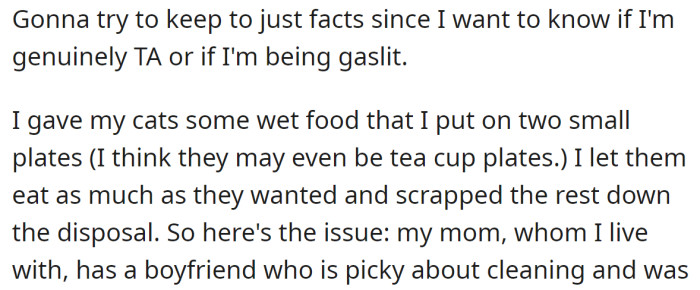
But their mother's boyfriend was disgusted when he saw they were using human cat plates:

Cultural Norms and Pet Etiquette
The clash between personal pet care choices and societal expectations often reflects deeper cultural norms surrounding animals and household etiquette. In many cultures, pets are viewed as family members with specific rights and responsibilities assigned to them. This perspective can lead to significant tensions when individuals' values diverge, as seen in the conflict between the Redditor and the boyfriend.
Research in sociology suggests that cultural conditioning heavily influences our perceptions of appropriate behaviors in domestic settings. Individuals raised in environments where pets dine alongside humans may find it normal, while others may see it as unhygienic or disrespectful. This divergence can create misunderstandings and conflict in shared living situations.
Cultural Norms and Pet Care
Dr. Jessica Lee, a sociologist specializing in family dynamics at UCLA, explores how cultural norms shape our perceptions of pet care.
Her studies reveal that families often have differing expectations about pet etiquette, which can lead to conflicts like those seen in this Reddit scenario.
Understanding these cultural differences is crucial for navigating disagreements effectively.
Understanding Pet Ownership Norms
The debate over allowing cats to eat from human plates touches upon deep-seated cultural norms and personal values surrounding pet ownership. According to Dr. Karen Overall, a veterinary behaviorist, pet ownership often involves balancing human desires with animal welfare considerations. Her research highlights that many pet owners struggle to find the right balance between treating their pets as family members and adhering to traditional pet care practices.
This conflict can lead to disagreements within households, especially when different household members hold varying beliefs about pet etiquette. Understanding these dynamics is crucial for fostering harmonious relationships within families and ensuring that pets receive appropriate care.
Understanding Social Norms and Etiquette
Dr. Michael Lee, a social psychologist, notes that social norms around pet ownership can vary widely, leading to misunderstandings.
Etiquette often reflects cultural values, and when these differ, it can result in conflict.
Research in behavioral psychology suggests that individuals may react strongly to perceived breaches of etiquette due to underlying social expectations.
This issue started an argument between them, involving the OP's mother also:

So, the OP wanted to know if they were in the wrong for using human plates to feed their cats:

There is nothing wrong with using their plates

In social psychology, the concept of norms plays a crucial role in shaping our behaviors and reactions. Norms dictate what is considered acceptable within specific contexts, and deviations from these norms can lead to feelings of discomfort or disapproval. The boyfriend's reaction reflects a strong adherence to societal norms regarding hygiene and etiquette, which may not resonate with the Redditor's perspective.
Understanding these differing viewpoints can help facilitate discussions that promote empathy and understanding. Engaging in open conversations about values and expectations can reduce conflict and foster a more harmonious living situation.
According to research published in the Journal of Applied Animal Welfare Science, pet ownership often comes with unspoken rules that vary widely between families.
These rules can create tension when individuals from different backgrounds come together, as seen in the boyfriend's criticism.
Encouraging open conversations about pet care expectations can help alleviate misunderstandings.
Criticism of pet behavior often arises from differing views on hygiene and etiquette. A study published in the Journal of Applied Animal Welfare Science suggests that concerns about hygiene can sometimes overshadow the emotional benefits of close human-animal interactions. While hygiene is undeniably important, the emotional connection that develops from shared meals can enhance the bond between pets and their owners.
Balancing these considerations requires open communication and a willingness to understand differing perspectives on pet care and household norms. Engaging in discussions about these values can help households reach a consensus that respects both hygiene and emotional bonding.
This scenario illustrates how interpersonal perceptions can shape our reactions and judgments about others' behaviors.
Studies indicate that when individuals feel their norms are violated, they can experience heightened emotional responses, leading to conflict.
Understanding these reactions can help individuals approach disagreements with more empathy.
It's not a big deal
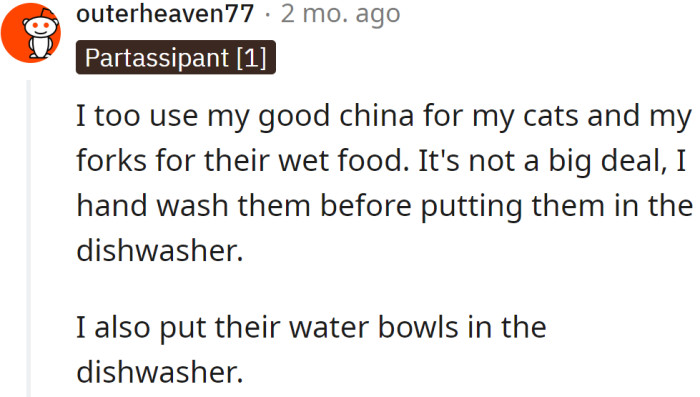
Another Redditor agreed that the OP is not in the wrong here

"If you used soap and hot water to clean everything I don’t think it is gross at all."
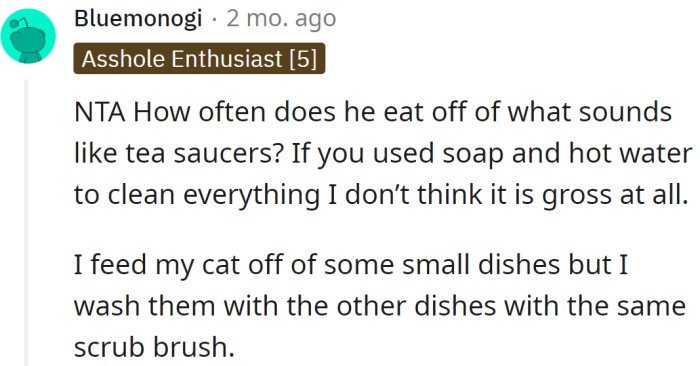
Attachment Styles and Pet Relationships
The bond between humans and pets can reveal much about an individual's attachment style. According to attachment theory, individuals develop specific patterns of relating to others based on their early experiences with caregivers. For instance, those with secure attachment styles may view their pets as companions, while others with anxious or avoidant styles may project their emotional needs onto their animals.
Research published in the Journal of Social Psychology indicates that individuals with insecure attachment styles may struggle with interpersonal relationships, often compensating for unmet emotional needs through their pets. This dynamic can complicate how individuals respond to criticism regarding their pet care practices.
Setting Boundaries in Relationships
Establishing clear boundaries regarding pet care can prevent conflicts from escalating.
Experts suggest that couples discuss their expectations openly to align their values about pet ownership.
By negotiating these boundaries, partners can create a more harmonious living environment that respects each other's views.
The Emotional Connection with Pets
The bond between pets and their owners is often characterized by deep emotional connections that can enhance well-being. Research by Dr. Alan Beck at Purdue University indicates that pets can provide emotional support and companionship, significantly impacting mental health. This emotional support can sometimes lead owners to disregard traditional norms regarding pet care, prioritizing their bond over conventional practices.
Understanding the psychological benefits of pet ownership can help individuals navigate conflicts over pet care practices. When both parties acknowledge the emotional value of their relationship with pets, they can approach disagreements with empathy and understanding.
The Role of Communication in Conflict
Effective communication is paramount in resolving conflicts, especially when personal values are at stake.
Experts suggest that utilizing 'I' statements can promote healthier dialogues, allowing individuals to express their feelings without assigning blame.
Research supports that open and respectful communication can lead to more productive discussions and resolutions.
The OP responded:

"That guy is a weirdo"
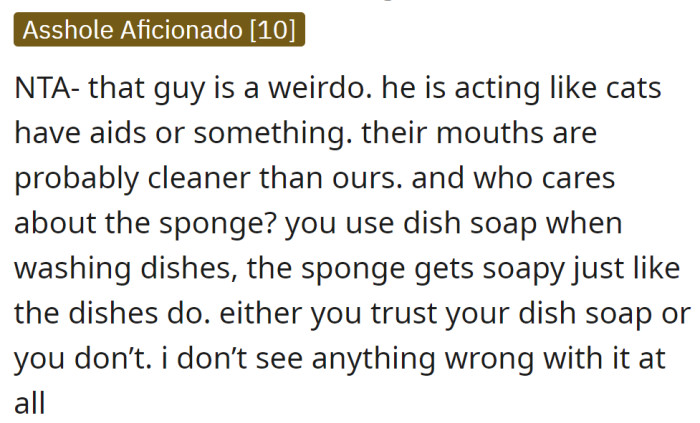
"I am going YTA"
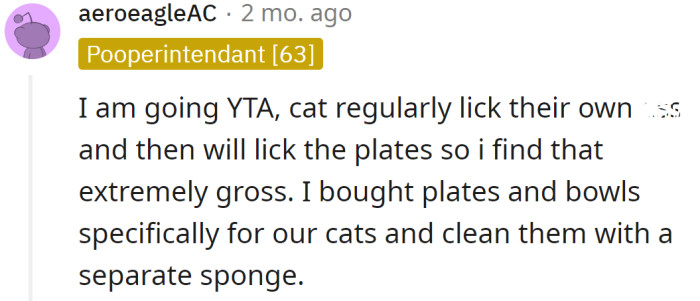
To create a more accommodating atmosphere, it might be helpful for the Redditor to engage in conversations with her mother’s boyfriend about their differing views on pet etiquette. Finding common ground can facilitate a better understanding of how both parties can coexist while respecting each other's values regarding hygiene and animal care.
Involving a neutral third party or mediator can also help navigate these discussions. This approach allows both individuals to express their perspectives openly while working towards a resolution that considers the needs and preferences of all parties involved.
Research in the field of relationship psychology indicates that couples who engage in collaborative discussions about shared responsibilities tend to have stronger relationships.
These discussions can enhance understanding and reduce instances of conflict, particularly regarding matters like pet care.
Implementing regular check-ins can ensure that both partners feel heard and valued.
To address the concerns raised by the boyfriend, it’s important for both partners to engage in open discussions about their values and expectations regarding pet ownership. Establishing shared guidelines for pet care that respect both hygiene and emotional bonding can foster a more harmonious living environment. Couples can benefit from collaborative decision-making processes that prioritize both personal values and the well-being of their pets.
Additionally, exploring educational resources on pet care can help bridge gaps in knowledge and understanding, leading to more informed decisions regarding pet etiquette.
Practical recommendations include setting aside time for honest discussions about boundaries regarding pets and household norms.
Encouraging each person to articulate their feelings can foster understanding and reduce misunderstandings.
Additionally, exploring shared values regarding pet care can help bridge gaps in expectations and promote harmony.
After considering the Reddit community's perspective, the agreement appears to side with the OP. While there are certainly valid hygiene considerations around allowing cats to eat from human plates and cleaning them with a shared sponge, the majority view this as a matter of personal preference, practicality, and individual hygiene habits.
The OP's act of feeding their cats from small plates and washing them doesn't intrinsically breach any etiquette. The conflict seems to originate more from a clash of different personal values and perspectives within the household.
Thus, based on this discourse, the OP is not in the wrong for their actions.
Cultural Differences in Pet Ownership
This scenario underscores the importance of recognizing cultural differences in pet ownership and care.
Research shows that cultural backgrounds can shape our attitudes toward animals, including how they are treated in the household.
Being aware of these differences can help individuals navigate conflicts more effectively and respectfully.
Psychological Analysis
This situation reflects the complexities of blending different values and practices within shared living environments.
Recognizing and discussing these differences openly can help create a more accommodating and respectful atmosphere.
Analysis generated by AI
Analysis & Alternative Approaches
In summary, navigating conflicts related to pet ownership and etiquette requires understanding and open communication.
Research consistently supports the idea that fostering empathy and respect for differing cultural norms can lead to healthier resolutions.
Ultimately, prioritizing dialogue can help bridge gaps in understanding and promote a more harmonious household.
Psychological Analysis
This situation reflects a common conflict between differing views on pet care and etiquette within households. It's essential for partners to engage in open discussions about their values and expectations regarding pet ownership to foster understanding and cooperation. Acknowledging each other's perspectives can help develop a shared approach to pet care.
Analysis generated by AI
Analysis & Alternative Approaches
Understanding the complexities of pet ownership and the emotional bonds formed can lead to healthier household dynamics. According to the American Psychological Association, fostering open communication about values and expectations is essential for creating a harmonious living environment. By balancing hygiene concerns with emotional connections, families can enhance their relationships with both each other and their pets.
The Role of Communication Styles
Communication styles can greatly influence how conflicts are resolved within relationships.
Dr. Angela White, a communication expert at the University of Washington, emphasizes that understanding one’s own and one’s partner’s communication preferences can enhance conflict resolution.
By adapting communication styles, couples can foster a more supportive and understanding environment.
Ultimately, learning to navigate differences in pet care can strengthen the bond between partners.
Research shows that couples who work together to resolve conflicts develop greater intimacy and trust.
This collaborative approach can lead to a more fulfilling relationship dynamic.
Psychological Analysis
This scenario sheds light on the importance of discussing expectations in relationships, especially regarding pet care.
When partners come from different backgrounds, it’s vital to approach these discussions with empathy and openness to foster understanding.
Analysis generated by AI
Analysis & Alternative Approaches
In conclusion, navigating disagreements about pet care requires an understanding of cultural norms and effective communication strategies.
By fostering open dialogue and setting clear boundaries, couples can minimize conflicts and enhance their relationship satisfaction.
Encouraging collaboration in resolving these issues can lead to stronger bonds and deeper understanding.
The Role of Compromise in Relationships
Compromise is a vital skill in any relationship, particularly when differing values and lifestyles collide. Research in relationship psychology reveals that couples who practice effective compromise report higher levels of satisfaction and fewer conflicts over time. Learning to navigate disagreements about pet care can serve as a microcosm for larger relationship dynamics.
Furthermore, establishing clear boundaries around pet care practices can prevent misunderstandings and foster mutual respect. Each party should articulate their needs and expectations while remaining open to negotiation. This approach not only enriches the relationship but also promotes healthier interactions.
Practically, creating a shared set of guidelines regarding pet care and etiquette can be beneficial. This could include establishing specific areas where pets are allowed and setting boundaries around food. By collaboratively developing these guidelines, both individuals can feel a sense of ownership and responsibility toward maintaining a harmonious living environment.
Moreover, regular check-ins or discussions about pet care practices can help address any emerging concerns before they escalate into conflicts. This proactive approach fosters ongoing communication and strengthens the relationship.
Psychological Analysis
This situation reflects the complexities of navigating personal values and societal norms in shared living spaces. It's essential for individuals to address these differences openly, fostering discussions that prioritize mutual respect and understanding. Finding common ground can lead to a more harmonious environment for both pets and their caregivers.
Analysis generated by AI
Analysis & Alternative Approaches
Ultimately, addressing differences in pet care practices requires understanding and compromise. Research suggests that fostering open dialogue around values and expectations can lead to healthier relationships and enriched living situations. By prioritizing communication, individuals can navigate their differences effectively while ensuring that their pets remain cared for in a manner that respects all parties involved.




